A Desperation Defense
Now that Joe Biden’s approval rating has fallen—it’s hovering in the low 40s, and it can’t get up—the Main Stream Media have come up with a new line of defense for their man. Okay, goes this new line, Biden isn’t doing so well, but that’s to be expected—because no president can do well. That is, the problems are just too tough, the job is just too hard, the country is just too polarized, yada yada yada.
As we shall see, history suggests that the American people won’t buy an argument based on hopelessness, which we can call the desperation defense. After all, Americans tend to be optimistic and solution-oriented. And so if an elected official can’t solve the problem, throw him out and give someone else a chance. That’s the American Way.
Yet the MSM, which certainly sees itself as higher and better than the American public and its bourgeois ways, is all in with its last-ditch apologia for the 46th president. For instance, there was this April 17 headline from CNN: “Biden confronts a host of problems he can’t do much to solve.” As the article sought to “journosplain” to us, “There’s not much he can do to curb inflation. There’s not much he can do to stop migrants from reaching America’s southern border. Or to reduce crime.” In fact, there is much that a president can do. And past presidents have done it. For instance, the 40th president, Ronald Reagan, dramatically cut inflation. And the 45th president, Donald Trump, significantly reduced immigration.
The CNN story even said of Biden, “There’s not much he can do to compel cooperation from defectors within his thin Democratic congressional majorities.” We might recall that Biden spent 36 years in the U.S. Senate, and another eight years, as vice president, as president of the Senate. Indeed, a key part of his argument for election in 2020 was that he was an insider who knew how to get things done in D.C. So now, to say that Biden can’t work with a Democratic Congress is to undercut the rationale for his presidency. (As noted, Biden’s supporters are desperate.)
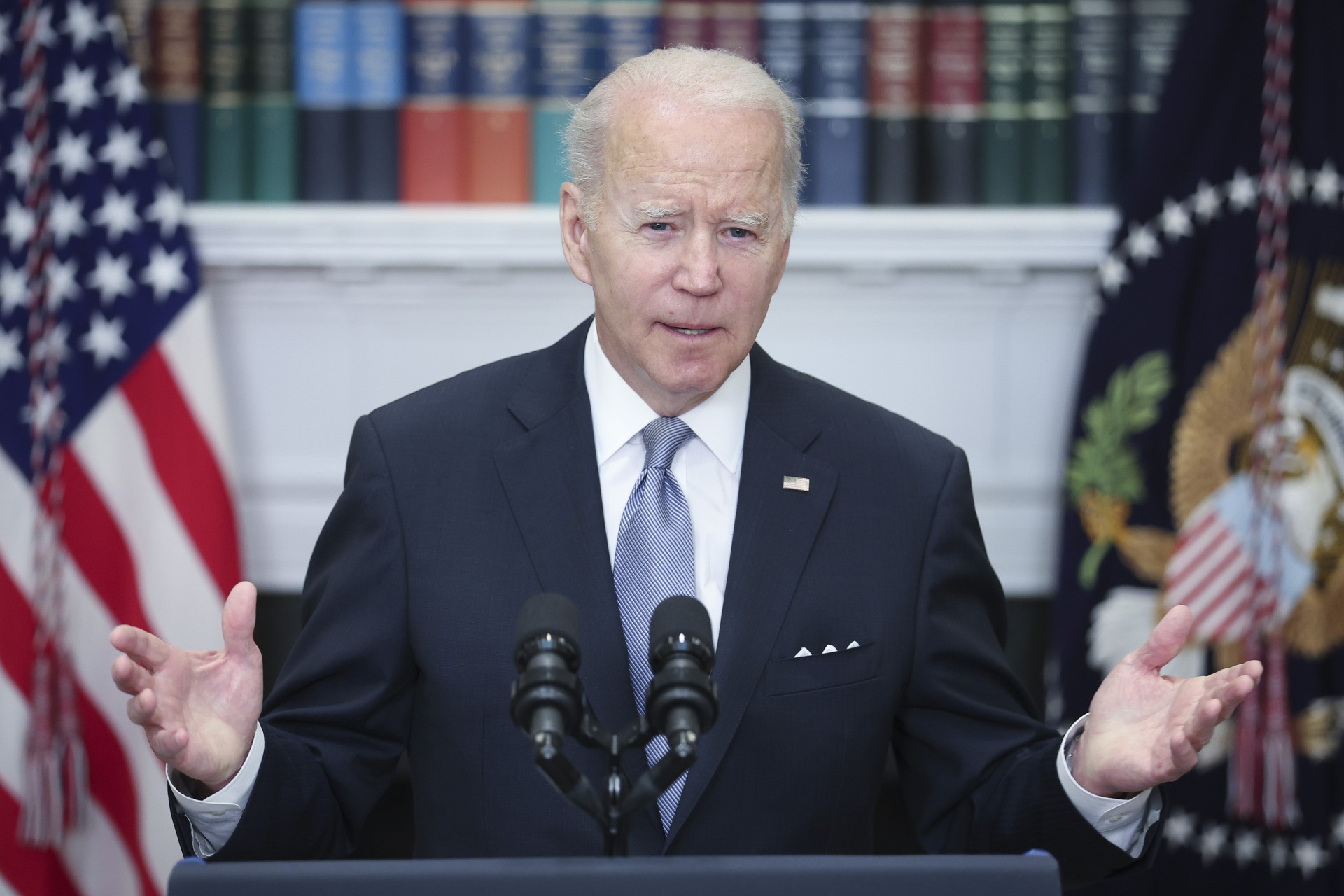
President Joe Biden delivers remarks at the White House April 21, 2022, in Washington, DC. (Win McNamee/Getty Images)
Here again, Ronald Reagan provides a reminder that presidential effectiveness is possible. In 1981 and 1986, working with a House of Representatives that was controlled by opposition Democrats, the Gipper managed to pass major tax-cut bills. How did Reagan do these things? Answer, hard work, good listening, persuasion, and, yes, compromise. Those are hardly trade secrets—although if Biden hasn’t mastered them by now, there’s little chance that he ever will.
In fact, the desperation defense of Biden has been going on for awhile now. Late last year The Atlantic opined:
Both the public and the media sometimes see the president as the commander of our ship of state—a kind of all-powerful steward of all affairs economic, geopolitical, and biological. But they should take the nautical metaphor more literally. Navy captains seem in control, but they inherit ships built by other people and steer vessels through wind and waves that don’t obey any sort of direction. That—not omnipotence—is the reality of the American presidency.
The idea here is that the president is just another passenger on the ship of state; the author continued, “the president’s circumscribed powers are best analogized to a small rudder turned by a captain amid an angry sea.” We are left to conclude that if the ship sinks, it’s not the captain’s fault.
Such absolution would be news to any sea captain. And in the U.S. Navy, if a captain loses a ship, or even suffers a serious accident, there’s an automatic inquiry, and often a court martial. Why? Because the Navy understands that the moment that commanders realize that they aren’t responsible for what happens, irresponsibility will reign.
But as we can see, the MSM doesn’t wish to hold Captain Biden to that high standard. Instead, The Atlantic closes off with this suggestion for a president: “There is always the serenity prayer.”
Then The Week jumped in, assuring us of Biden, “Sometimes he has been the victim of circumstances . . . and that’s not entirely his fault.” The piece added, “In the case of these major legislative proposals, the buck doesn’t really stop with him.” By contrast, an earlier Democratic president, Harry Truman, was famous for the sign on his desk: “The Buck Stops Here.” In his nearly eight years in the Oval Office, 1945-1953, Truman was willing to make tough decisions—and to accept the consequences. It’s called leadership.
But that was then. Today, in its stab at a defense of Biden, MSNBC praised his “brave” energy policy, even as the liberal network sought to isolate him from blame for shortages and high prices: “The biggest issue isn’t the domestic supply of oil,” the article continued, adding that the real problem is “how much Americans love and expect cheap gas, a problem the U.S. has only encouraged as an automobile-centric society.” You knew that was coming, didn’t you? You knew that any MSM defense of Democratic energy policy was going to turn into attack on American consumers. The only hope, the article added, is “mass transit options.”
For his part, Biden himself has been eager to shift the blame. Addressing gasoline prices, on April 20 he tweeted, “Let’s be absolutely clear about why prices are high right now: COVID and Vladimir Putin.”
Got that? The president wants you to forget any notion that the cancellation of the Keystone Pipeline, or all the other Biden anti-energy policies, have anything to do with high gas prices. Instead, blame others.
One close observer who has no patience for such dodging is Sen. Bill Cassidy (R-LA), who tweeted in response, “The administration is still slow-walking the permits needed to actually produce tomorrow. We need an Energy Operation Warp Speed to get us out of the hole this administration has dug us into.”
The administration is still slow-walking the permits needed to actually produce tomorrow. We need an Energy Operation Warp Speed to get us out of the hole this administration has dug us into. https://t.co/VeHnCc5fNt
— U.S. Senator Bill Cassidy, M.D. (@SenBillCassidy) April 21, 2022
Amusingly, the Republican National Committee dug up a Biden tweet from exactly two years before, on April 20, 2020; back then, candidate Biden said of Donald Trump: “The President needs to stop blaming others and do his job.”
TWO YEARS AGO TODAY: Do you remember this, @JoeBiden? pic.twitter.com/t4rNtSqeZv
— RNC Research (@RNCResearch) April 20, 2022
It’s not a good look for a president to blame everyone but himself. And it’s also not a winning look—ask Jimmy Carter. Nearly half a century ago, the 39th president sang the same song of poor, poor pitiful me, and he, too, had the major media on his side. Yet when he ran for re-election, the refrain didn’t do him a lick of good.
Jimmy Carter’s Self-Pity
Jimmy Carter came into office with high hopes. Elected on a clean-government platform in the wake of Watergate, Carter pledged that he would never lie to the American people.
Yet the truth was soon revealed: Carter was not up to the job. For one thing, inflation started rising—are we started to see a pattern with Democratic presidents? Yet then came the same liberal defense-reflex: It’s not the commander-in-chief’s fault. As the liberal Brookings Institution argued in mid-1978, “many of the nation’s problem’s are highly intractable.”
As the country skidded in the late 70s—the oft-heard word back then was stagflation—Carter had a curious response: He didn’t blame himself, he blamed the American people. As he said in his notorious “malaise” speech of July 15, 1979:
It is a crisis of confidence. It is a crisis that strikes at the very heart and soul and spirit of our national will. We can see this crisis in the growing doubt about the meaning of our own lives and in the loss of a unity of purpose for our nation.
This author, who worked on Ronald Reagan’s presidential campaign back then, can remember the candidate saying wryly, “Oh, so Carter’s faults are our fault.”
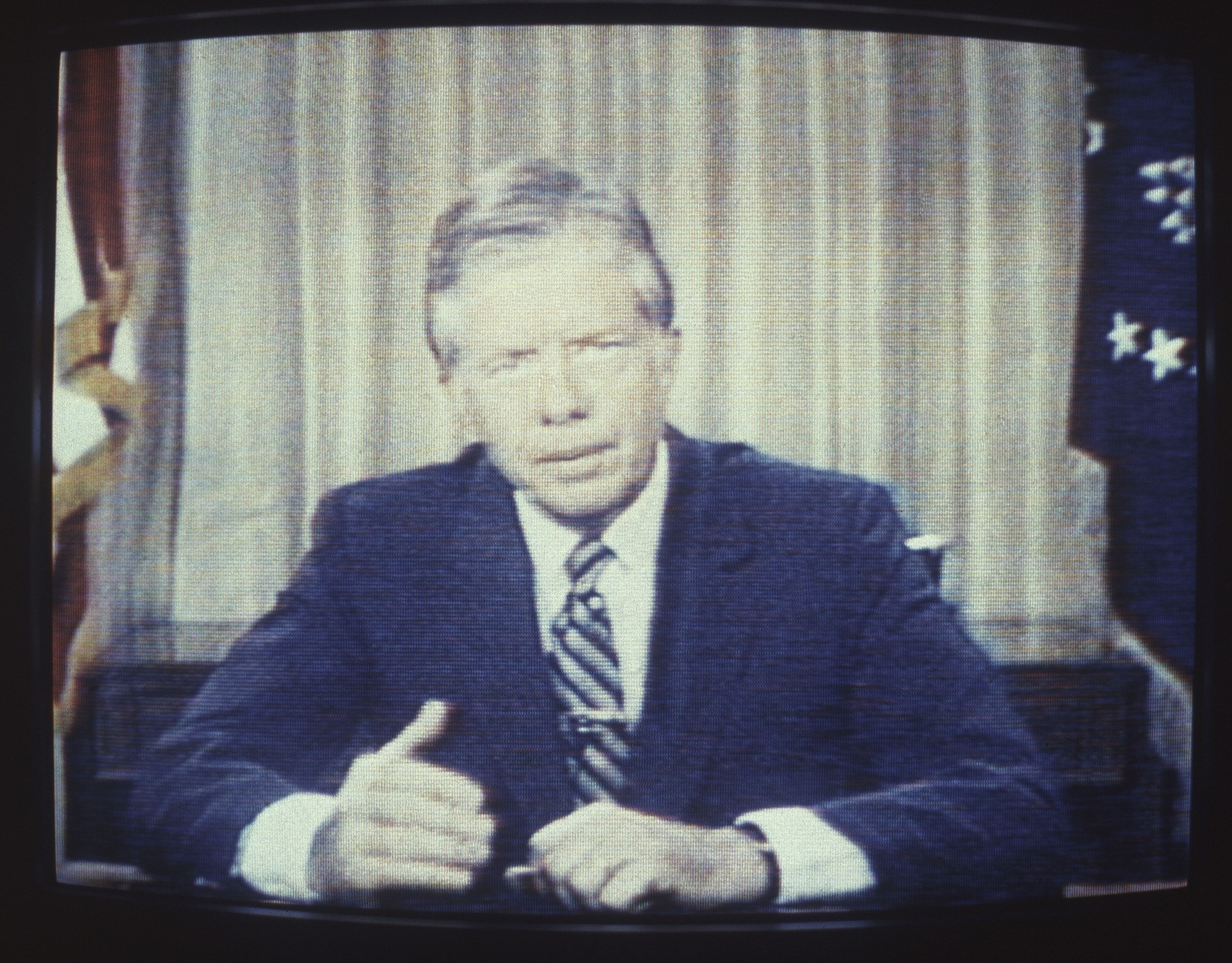
President Jimmy Carter delivers his energy speech, which became known as the “malaise” speech, on television on July 15, 1979. (AP Photo/Dale G. Young)
Yet Carter found a sympathetic shoulder to cry on at—where else?—The Washington Post. As he told the Post that same year, inflation is “an uncontrollable situation.” Carter added that it’s “almost impossible” for a president to succeed, because “most of the decisions that have to be made by a president are inherently not popular ones.”
The miserableness of Carter’s situation was not lost on his own staffers. And so they thought to make the best of their weakness by attacking their challenger, Reagan. As a “top White House aide” told The Wall Street Journal on August 14, 1980, “Why throw this bum out who has some experience for a bum with no experience?” That quote reveals much about the cynical and bleak inner mindset of the Carterites.
For his part, Reagan, who had twice as much gubernatorial experience as Carter (two terms as governor of California, compared to Carter’s one term in Georgia), was having none of Carter’s excuses.
In his 1980 acceptance speech at the Detroit Republican convention, Reagan took note of the Democrats’ desperation defense: “They tell us they have done the most that humanly could be done.” And then Reagan pinned the blame on the donkey: “The major issue of this campaign is the direct political, personal and moral responsibility of Democratic party leadership—in the White House and in Congress—for this unprecedented calamity which has befallen us.” That November, Reagan beat Carter by ten percentage points, carrying 41 states.
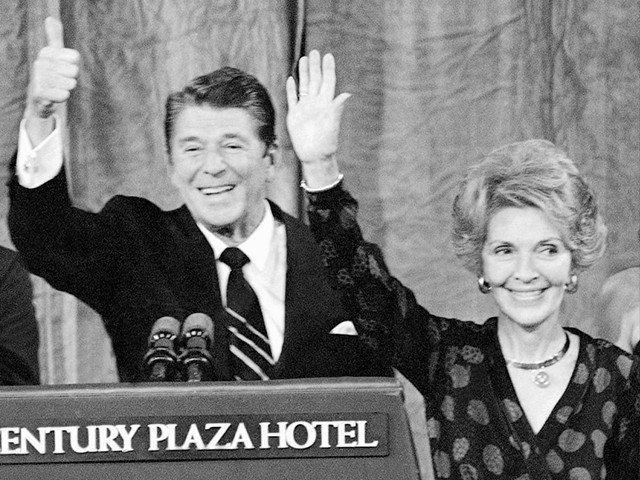
Ronald Reagan and his wife, Nancy, wave to supporters on election night, November 4, 1980, after his landslide victory. (AP Photo)
One lesson from the Carter Era is that the desperation defense doesn’t work: The voters won’t buy that trying is good enough—they will insist on succeeding.
Yet here’s the thing: Because Carter was, and is, a Democrat, the media have never stopped trying to cover for him. That is, even four decades later, the MSM regards Carter, not as a bad president, but as a victim. And that grading on a curve—call it the Carter Curve—has implications for Biden.
Carter Victimology Inspires Biden Victimology
The spin that nothing was Carter’s fault started immediately after he left office. The former president’s top aide, Hamilton Jordan, was quick with a 1982 memoir, Crisis, in which he declared that his boss “had been elected and was faced with energy shortages and a sick economy.” (Actually, that was not true, but fortunately for Jordan, the term “fake news” hadn’t been invented yet.)
Famed NBC News anchor David Brinkley opined of the former president, “several failures during his term were not his fault.”
And former House Speaker Tip O’Neill (D-MA), who served alongside Carter (and who was not a fan), nevertheless stuck to the party line in his 1987 memoir: “Jimmy Carter was a victim of bad luck…It wasn’t his fault that oil prices tripled and wrecked our economy.” Well, actually, it was Carter’s fault, because America has enough oil to make a difference in the world price if it wants to. And so when when Reagan decontrolled oil prices in 1981, it caused domestic production to surge, and the price of oil, worldwide, fell by two-thirds.
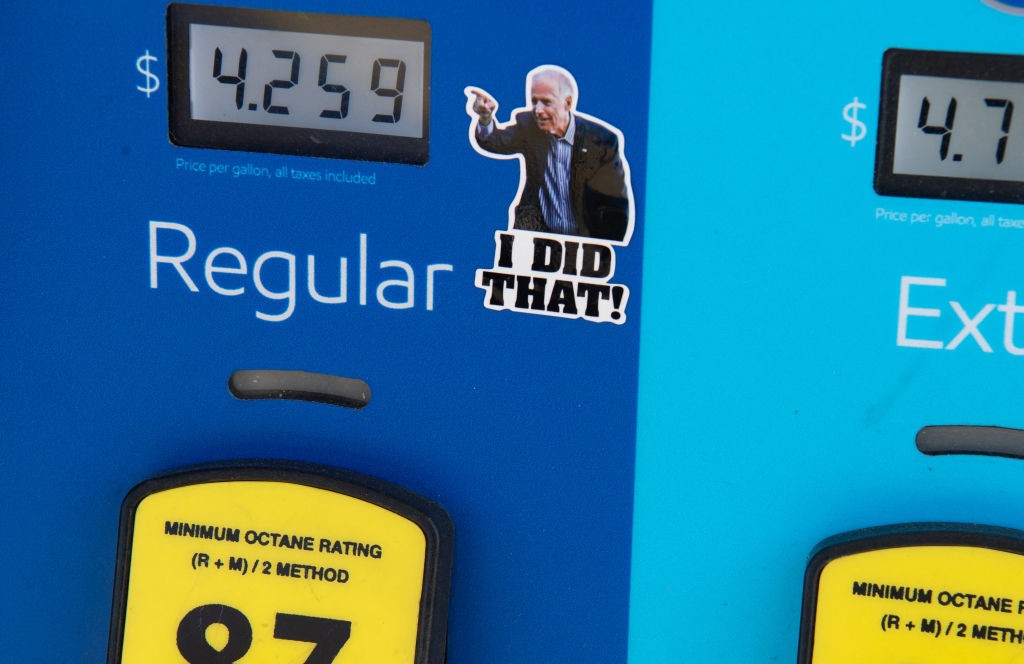
A gas pump displays current fuel prices, along with a sticker of U.S. President Joe Biden, at a gas station in Arlington, Virginia, on March 16, 2022. (SAUL LOEB/AFP via Getty Images)
Yet partisan loyalists never the let facts get in their way—and that’s been good news for Carter. Typical of the drumbeat, across the decades, was a 2019 opinion piece in The Hill, which argued that Carter’s inflation was “driven mainly by Johnson/Nixon policies, the 1973 Arab oil embargo and the 1979 collapse of Iranian oil supply due to its revolution.” Thus the motto of post-Truman Democrats: The Buck Stops There!
Needless to say, dutiful Carter fans are always searching his record for the tiniest specks of achievement. For instance, in his admiring biography of Carter, former Newsweek reporter Jonathan Alter hailed him as “the first global leader to recognize the problem of climate change.” And in late 2021, the Washington Post argued that:
Carter had excellent policies. He placed the solar panels on the White House roof, supported other renewables, got excited about energy efficiency and preached the necessity of seemingly esoteric policies like cogeneration of heat and electricity.
We can step back and see: If Carter is still basking in praise for picayune details, despite macro failures, it’s easy to see how Biden would expect that he, too, will get praise for any little gesture—and not be held to account for big things, such as inflation.
So when the criticism of Biden did come, the MSM has been nonplussed. New York magazine lamented, “The Jimmy Carter Redux game has returned with a vengeance in negative assessments of Joe Biden.” And it’s not nice!
Now, of course, comes the immigration issue, and it’s big. It’s coming in the form of Title 42 enforcement–or should we say, non-enforcement. As we know, Democratic senators are jumping ship on the administration (replaying what happened to Carter in the late 1970s), and yet Biden still has his friends in the media, doing their best.
As the Associated Press put it on April 22, “President Joe Biden has an election-year message for frustrated voters: At least he’s trying.”
Across the decades, the song remains the same.
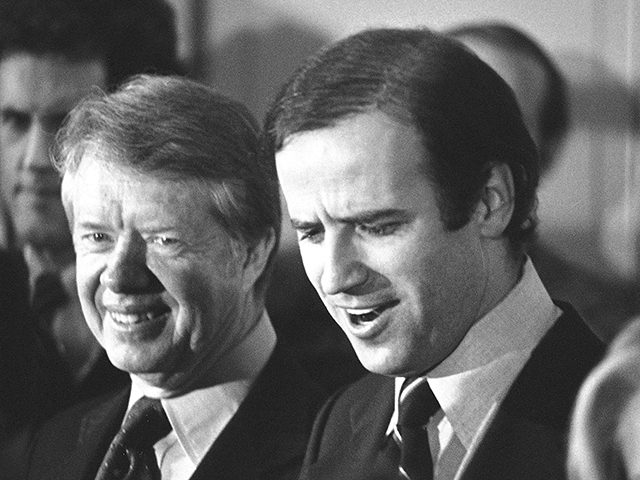
COMMENTS
Please let us know if you're having issues with commenting.